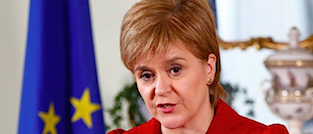The Scottish Government said on Tuesday that leaving the European Union could cost the Scottish economy up to £11.2 billion a year and Scottish public finances up to £3.7 billion a year by 2030 depending on post-Brexit trading arrangements.
Analysis published by the Scottish Government based on research by what it called “a range of external organisations” said that by 2030 Scottish GDP could be between £1.7 billion and £11.2 billion a year lower due to Brexit.
The analysis projected that tax revenue would be between £1.7 billion and £3.7 billion a year lower.
Scotland voted in favour of remaining in the EU by 62% to 38% but the UK as a whole voting to leave the EU by 51.9% to 48.1%.
First Minister Nicola Sturgeon said that the analysis was further evidence of the need to protect Scotland’s relationship with the EU.
The research showed that pursing an option short of full EU membership risked damaging Scottish exports, made the country a less attractive location for overseas investors and reduced future economic growth and prosperity, the Scottish Government said.
A UK Government spokesperson responded: “The Scottish Government’s own analysis acknowledges the huge degree of uncertainty around predicting economic impacts as far into the future as 2030.
“Its estimates vary wildly.
“The analysis warns of short term economic uncertainty.
“But, as the Secretary of State for Scotland has said recently, the real uncertainty for Scotland’s economy is being caused by Nicola Sturgeon’s talk of a second independence referendum.
“Rather than open itself to accusations of scaremongering and of damaging the Scottish economy, the Scottish Government’s priority should be to work closely with the UK Government to ensure the best deal for Scotland and the whole of the UK as we prepare to leave the EU.”
Sturgeon maintained the research showed “in the starkest possible terms” the potentially huge cost to Scotland of being taken out of the European Union and the single market.
“This analysis – based on a wide range of sources – demonstrates that leaving the EU, under any potential alternative arrangement, will have a profound and long-lasting impact on the public finances and the wider economic and societal wellbeing of both Scotland and the UK as a whole,” said Sturgeon.
“That stark picture outlined today means that, whatever the model of relationship with the EU which is chosen by the UK Government in their negotiations before and after Article 50 is triggered, it will not be as economically beneficial as full EU membership.
“The only way to protect Scotland’s economy – and the clear benefits which come from being part of the world’s biggest single market – is to work to ensure we protect our relationship with the EU.
“My government is absolutely committed to pursuing every possible avenue and option to do that.
“I have already had useful talks with the new Prime Minister, the EU institutions and individual member states in order to pursue that objective, and these are discussions which will continue in the weeks and months ahead.
“It is simply unacceptable that Scotland faces the prospect risk being dragged out of the EU against its will, and today’s paper shows the possibly massive costs that would entail, with all the wider repercussions that would be likely to ensue in terms of jobs, investment and long-term prosperity.”
Read the full report: http://www.gov.scot/Resource/0050/00504615.pdf
